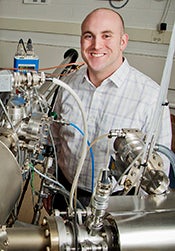Complex-oxide materials possess a range of interesting properties and phenomena that make them candidates for next-generation devices and applications. But before these materials can be integrated into state-of-the-art devices, it is important to understand how to control and engineer their response in a deterministic manner. In this talk, we will discuss some of the state-of-the-art science, engineering, and utilization of complex ferroic materials and their potential for emergent order and phenomena that can enable new device function. We will explore the role of the epitaxial thin-film growth process and the use of epitaxial constraints to engineer a range of systems with special attention to ferroelectric and relaxor materials. In recent years, the use of epitaxial strain has enabled the production of model versions of these complicated materials and the subsequent deterministic study of field-dependent response. Here, we will investigate the potential of ferroelectric materials for non-volatile, ultra-low voltage memory and logic applications, the realization of multi-state/neuromorphic function, and even high energy density capacitive energy storage applications. We will try to introduce the listener to these complex materials and their potential for new applications – in effect working to motivate engineers to explore these materials. The discussion will range from the development of fundamental understanding of the physics that lies at the heart of the observed effects, to an illustration of routes to manipulate and control these effects, to the demonstration of rudimentary solid-state devices based on these materials.

Lane W. Martin is Chancellor’s Professor and Chair of the Department of Materials Science and Engineering at the University of California, Berkeley and a Faculty Scientist in the Materials Sciences Division at Lawrence Berkeley National Laboratory. Lane received his B.S. in Materials Science and Engineering from Carnegie Mellon University in Dec. 2003 and his M.S. and Ph.D. in Materials Science and Engineering from the University of California, Berkeley in May 2006 and 2008, respectively. From 2008 to 2009, Lane served as a Postdoctoral Fellow in the Quantum Materials Program, Materials Sciences Division, Lawrence Berkeley National Laboratory. From 2009 to 2014, Lane was an Assistant Professor in the Department of Materials Science and Engineering at the University of Illinois, Urbana-Champaign. Lane returned to the University of California, Berkeley as an Associate Professor from 2014-2018. He was promoted to Professor in July 2018, served as Vice/Associate Chair from Aug. 2018 until he moved into his current positions in July 2021. Lane has published >240 papers, his work has been cited >24,100 times (resulting in an h-index = 70; i10-index = 205), and he has given >160 invited/plenary/keynote talks during his career. Lane’s work has garnered a number of awards including: being named a Fellow of the American Ceramics Society (ACerS, 2022), Fellow of the American Physical Society (APS, 2021), selected to the 2022-2024 Defense Science Study Group, multiple-time Highly Cited Researcher (ranked in the top 1% by citations for field and publication year in Web of Science), the IEEE-Ultrasonics, Ferroelectrics, and Frequency Control (UFFC) Society Ferroelectrics Young Investigator Award (2019), the Robert L. Coble Award for Young Scholars from the American Ceramic Society (2016), the American Association for Crystal Growth (AACG) Young Author Award (2015), the Presidential Early Career Award for Scientists and Engineers (2014), the Dean’s Award for Research Excellence for the University of Illinois, Urbana-Champaign (2013), the National Science Foundation CAREER Award (2012), the Army Research Office Young Investigator Program Award (2010), and others. Lane’s contributions to physical and materials science are broad reaching, but his focus is on advancing the synthesis, characterization, and utilization of emergent function (be that electronic, ferroic, multiferroic, etc.) in complex oxides. Lane applies innovative synthesis of highly controlled, epitaxial thin-film materials with special attention to accessing new states of matter, uses growth and epitaxy to access new insights about foundational materials physics, and pushes the edge of material response via strain, defect, and interfacial engineering. Lane embraces cross-disciplinary, collaborative research and leverages it to drive innovation.

